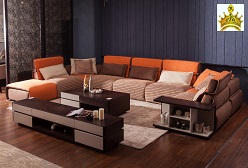By Anwar Hussen Mohammed – The demand for furniture in Ethiopia is diverse, ranging from residential to commercial and institutional sectors. With a population of over 120 million people, there is a substantial market for furniture products. Additionally, the construction boom in Ethiopia has also contributed to the increased demand for furniture, as new residential and commercial buildings require furnishing.
In recent years, there has been a growing trend towards modern and contemporary furniture designs in Ethiopia. This shift in consumer preferences has led to an increase in the importation of high-quality furniture products from international markets. However, there is also a burgeoning local manufacturing sector that caters to the domestic demand for furniture.
The furniture market in Ethiopia has been experiencing significant growth in recent years. The demand for furniture in the country has been driven by factors such as urbanization, a growing middle class, and an increase in disposable income. As a result, the market value of the furniture industry in Ethiopia has been on the rise.
Ethiopia’s expenditure on the import of furniture products has shown fluctuations over the years, according to the United Nations Comtrade database,. In 2019, Ethiopia imported furniture and related products worth approximately $97 million. This figure represents the total amount spent on importing various types of furniture, including seats, mattresses, and other items.
The furniture industry in Ethiopia holds significant potential and offers various opportunities for growth and development. The country’s rich cultural heritage, natural resources, and growing economy contribute to the favorable conditions for the furniture sector.
Ethiopia’s furniture industry has the potential to become a key player in the global market due to its abundant supply of raw materials, skilled labor force, and increasing domestic and international demand.
A recent report shows that Revenue in the Furniture market amounts to US$617.10m in 2023. The market is expected to grow annually by 10.36% (CAGR 2023-2028).The market’s largest segment is the segment Living Room Furniture with a market volume of US$207.50m in 2023.
One of the primary factors contributing to the potential of Ethiopia’s furniture industry is the availability of diverse raw materials. The country is endowed with a variety of wood species such as teak, mahogany, and acacia, which are highly sought after for furniture production.
Additionally, Ethiopia has an abundance of bamboo, which is increasingly being recognized as a sustainable and versatile material for furniture making. The availability of these raw materials provides a competitive advantage for Ethiopian furniture manufacturers in terms of cost-effectiveness and product quality.
Furthermore, Ethiopia’s skilled labor force presents a significant opportunity for the furniture industry. The country has a large pool of artisans and craftsmen with expertise in traditional woodworking techniques as well as modern manufacturing processes. This skilled workforce enables the production of high-quality, handcrafted furniture that appeals to both domestic and international markets. Moreover, the government’s focus on vocational training programs aimed at enhancing technical skills further strengthens the industry’s potential by ensuring a continuous supply of skilled labor.
In recent years, Ethiopia has witnessed robust economic growth and urbanization, leading to an increase in disposable income and consumer spending. This trend has resulted in a growing domestic market for furniture products, including residential, commercial, and hospitality segments. Additionally, Ethiopia’s strategic location provides access to regional and international markets, offering opportunities for export expansion.
The government of Ethiopia has also been proactive in creating an enabling environment for investment in the furniture industry. Initiatives such as industrial parks, special economic zones, and investment incentives aim to attract local and foreign investors to establish manufacturing facilities and production units. These efforts contribute to the industry’s potential for growth and competitiveness on a global scale.
Moreover, there is a rising global demand for sustainable and ethically sourced products, including furniture. Ethiopia’s commitment to sustainable forest management practices and eco-friendly production methods positions its furniture industry favorably in meeting this demand. By emphasizing environmentally conscious manufacturing processes and utilizing renewable resources, Ethiopian furniture manufacturers can capitalize on emerging market trends focused on sustainability.
Investment Opportunities: Ethiopia offers a range of investment opportunities in its furniture industry. The country’s rich sources of wood, including teak, mahogany, and eucalyptus, provide a solid foundation for the production of high-quality furniture. Moreover, the availability of skilled artisans and craftsmen has further enhanced the industry’s potential for growth and innovation.
Government Support
The Ethiopian government has implemented various policies and initiatives to support the development of the furniture sector. These include incentives such as tax breaks, access to land for industrial purposes, and efforts to streamline bureaucratic processes for investors. Additionally, the government has been proactive in promoting the industry through trade fairs, exhibitions, and international partnerships to attract foreign direct investment.
Market Potential
The domestic market for furniture in Ethiopia is expanding rapidly due to urbanization, rising disposable incomes, and a growing middle class. Furthermore, the country’s proximity to key regional markets presents export opportunities for Ethiopian furniture manufacturers. With increasing demand for quality furniture both domestically and internationally, investors have recognized the potential for substantial returns on investment in Ethiopia’s furniture industry.
Challenges
Despite the promising prospects, there are challenges that investors need to consider when entering the Ethiopian furniture market. These include infrastructure limitations, access to finance, and navigating regulatory frameworks. However, with ongoing efforts by the government to address these challenges and improve the business environment, the overall investment climate continues to become more favorable.
In general, investment in the furniture manufacturing industry in Ethiopia can be challenging due to limited access to raw materials, inadequate infrastructure, limited skilled labor, and high taxes and regulations. However, the industry also offers significant opportunities for growth and profit, including a large and growing market, government support, and access to international markets. With careful planning, investment, and execution, companies can overcome the challenges and capitalize on the opportunities in the furniture manufacturing industry in Ethiopia.
